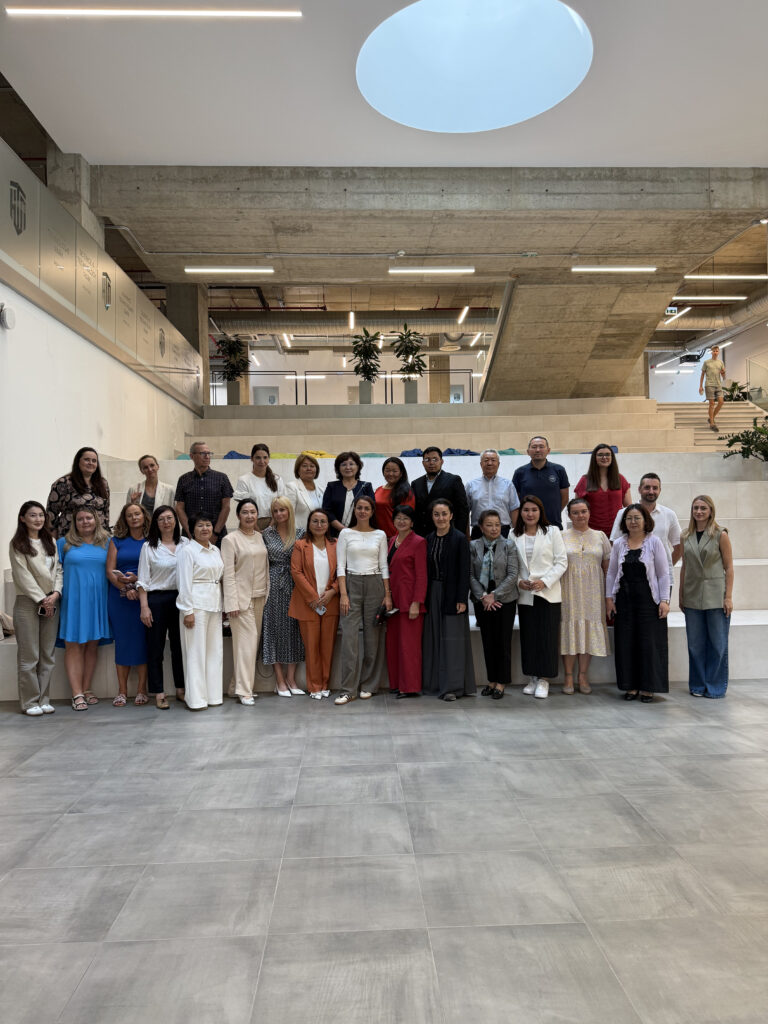1st Train the Teachers Workshop Empowers Educators for the Green and Digital Transition

The first Train the Teachers Workshop held within the GreenTech Horizons project brought together over 30 academic professionals from across Europe, Central Asia, and the Neighbourhood East region for a transformative five-day training program.
Participants came from universities and partner organizations such as:
● University of Novi Sad (Serbia)
● University of Split (Croatia)
● Riga Technical University (Latvia)
● Kaunas University of Technology (Lithuania)
● European Academy (Latvia)
● University of Information Technology and Management (Poland)
● Mongolian University of Science and Technology (Mongolia)
● National University of Mongolia (Mongolia)
● Al-Farabi Kazakh National University (Kazakhstan)
● International Engineering-Technological University (Kazakhstan)
● Almaty Technological University (Kazakhstan)
Organized at the University of Novi Sad from 8 to 12 September 2025, the workshop aimed to equip university staff with innovative pedagogical approaches and practical tools for embedding green and digital transition topics into higher education curricula. Through interactive lectures, project-based exercises, and peer-learning sessions, participants co-developed new teaching strategies aligned with sustainability, entrepreneurship, and digital readiness goals.




The workshop offered hands-on engagement with newly designed curriculum modules on Green and Sustainable Project Management, Sustainable Business Strategies, and Green Entrepreneurship & Innovation.
Each day focused on a specific theme, combining theoretical input with practical applications such as stakeholder mapping, case analysis, digital tool integration, and reflection activities. Sessions emphasized experiential and project-based learning, drawing from EU frameworks including EntreComp, the Deep Tech Talent Initiative, and the CSRD. Activities were supported by tools like Miro, Moodle, and gamification platforms, ensuring participant immersion and active contribution.
A core strength of the training was its focus on authenticity and contextualization.
Educators shared examples from their local environments, highlighting challenges such as resource limitations or institutional inertia, but also showcasing opportunities for innovation, regional collaboration, and curriculum renewal. The diversity of participants—from institutions in Serbia, Latvia, Lithuania, Croatia, Poland, Kazakhstan, Mongolia, and beyond—enriched discussions and fostered a vibrant community of practice. As one participant noted, “Being part of this training reminded me that innovation in teaching starts with meaningful connections and shared purpose.”
Sessions also covered strategies for delivering high-impact blended and online learning.
Participants explored digital minimalism, Bloom-aligned course design, flipped classroom models, and simulation-based teaching. Collaborative design canvases, visual mind maps, and peer feedback helped translate theoretical concepts into applicable methods. The workshop culminated in practical preparation for piloting activities and upcoming joint training sessions, with a strong emphasis on multiplying impact across partner institutions.
“The most valuable part of this training wasn’t just the content – it was the energy, honesty, and collaboration we experienced every day.”
— Workshop participant, GreenTech Horizons consortium

As a bonus, participants attended the international EV Days 2025 conference, connecting training content with real-world sustainability and mobility trends.
Held at the Novi Sad Fair, the event featured panels on electric vehicle technology, smart city solutions, and ESG implementation, deepening participants’ understanding of sustainability in practice. The overall workshop experience not only enhanced pedagogical capacities but also strengthened cross-border collaboration and set the stage for the next milestones in GreenTech Horizons, including the joint training school in Kaunas and Riga in January 2026.


